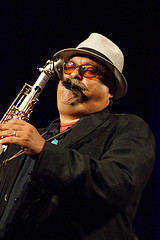Mar 8, 2011
Joe Lovano, Regattabar, October 14, 2010
 Das Ganze ist das Unwahre. – Theodor Adorno
Das Ganze ist das Unwahre. – Theodor Adorno
It was some months ago now that I saw Joe Lovano and the Us Five band (pianist James Weidman, bassist Peter Slavov, who was filling in for the suddenly famous Esperanza Spalding, and drummers Otis Brown III and Francisco Mela) at the Regattabar. At the time I thought they were the best jazz band I’d ever seen. Why?
First of all, they had the most beautifully organic sound with a wild spaciousness to it. It was also like being in a bohemian atelier or beat workshop with the music bouncing and reflecting off paintings and posters, bottles and tables, windows and alleys. Or, at times, like being on a pirate ship or a fishing boat. Wood. Space. Heat. Earth. Light. Etc.
Second of all, they were playing, with real mastery and joy, also, in an early sixties/late fifties style that was disciplined and structured (in like a Mingus way) and, at the same time, casually intense and free (i.e., played with a kind of abandon verging on the wanton).
Third, there was Lovano himself. With his hat and his sunglasses and his soul patch he was the textbook jazz cat—really archetypical, man. He’s got a warm, sculpted tone, has a concept that’s dense, mellow, focused, and figured, and sometimes goes for the raggedy, fraying-into-madness sound of 1961-ish Trane (remaining, for all that, on the homage side of mimicry).
And that’s why I thought they were the best I’d heard. (In fairness, I have since seen Charles Lloyd’s Quartet, featuring Jason Moran, and Vijay Iyers’ trio, featuring the stunning young drummer, Marcus Gilmore, and these two groups were, in their way, just as “best” as Lovano and crew. I’ll share my thoughts on these other guys anon.)
Image Source: Ivan Barberis.
Author’s Note: I chose the line from Adorno as an epigraph because, as I was setting down to complete this post, I thought to myself, “Why should it matter or should anyone care that I saw this music and liked it?” Indeed, such misgivings would probably explain the months which intervened between actually seeing this group of musicians and finally posting something about it here. Basically, I felt that there was something hopelessly vain and trivially narcissistic about sharing my impressions of the evening. Shouldn’t I instead be weighing in on the weighty issues of the day? Some guys play jazz well? So what? What about the millions of unemployed? What about the nation’s burgeoning debt? What about the ongoing conflict in Afghanistan and our troubled relations with their volatile neighbor, Pakistan? Today, we can’t escape knowledge of the world and its far-flung instabilities, atrocities, and absurdities. I mean, we live at a time when the most monumental and the most meaningless events can exist side-by-side, just two tabs in a browser. And one can be experiencing the most mindless moment of daily existence—buying canned soup and crackers at the grocers—and yet know that somewhere else at about the same time people are being shot by a helicopter gunship. Hegel insisted that if we were to understand the truth of the one event—Gaddafi loyalists and mercenaries opening fire on the rebels, for example—we’d have to strive to understand its relationship to the more everyday buying of soup in a sleepy, North American suburb, and, furthermore, we’d have to relate these two events to all other simultaneous events and the never-ending, convoluted tapestry of causes preceding them. In other words, as Hegel put it, “The Entirety is the True” [Das Ganze ist Das Wahre.] But the burden of that totality tends to crush all significance from the little instances of life that comprise our individual destinies in the top 10% of American households. And if we can’t find some solace or inspiration in these fleeting instances, which, in the end, may be all we ever truly have of life, the only things that are ours alone, then life is precisely as hollow as the ecclesiasts suggested. However, because I wanted to point out that there was at least one moment on Earth, when these men were playing jazz, that something beautiful and human and memorable and important was happening, and because I did not want to have to qualify that statement by pointing out that the music was being played in an expensive hotel before an audience that had readily paid for admission and on top of that could afford to pay for drinks and snacks and that this event was taking place in spite of poverty and hunger and suffering (somewhere a child is being beaten, a woman is being raped, a prisoner is being tortured, and so on) and in a place that had once been a colony and where, less than a mile away, they design, among other things, nuclear weapons, etc., I invoked the spirit of Adorno who, as much as he despised jazz, understood that the privilege of the whole was, inevitably, a tyranny over the part.
[…] unmet but, rather, of hopes unfulfilled. For what had I hoped? Well, like I said, I’ve seen some pretty good bands lately, bands who played with intensity, sublimity and immediacy and by whom I was alternately […]
[…] drummers Otis Brown III and Francisco Mela, opened their two night stand at Scullers last night. I saw the group almost exactly two years ago (sans Spalding—Peter Slavov handled bass duties) and, at that time, thought that they were the […]